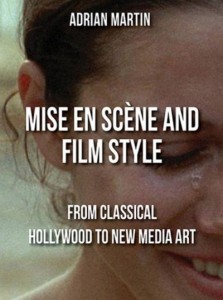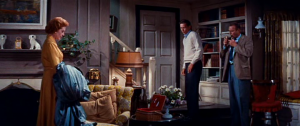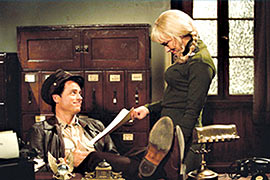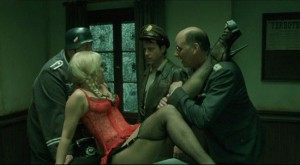
It’s a genuine pity that this remarkable new book — a kind of summation and extension of Adrian Martin’s work in film analysis and the history of film criticism in Australia, France, Spain, the U.K., and the U.S. over the past two decades — is commercially available only at the whopping price of $80.75 on Amazon — or $76, if you’re willing to settle for a Kindle edition. As a longtime friend, colleague, and collaborator of Martin’s, I was fortunate enough to receive a free inscribed copy, but most of the rest of you will have to either shell out a fortune or wait for a softcover edition. All I can do now, really, having received this book only yesterday, is signal just a few of its many riches. Girish Shambu, Adrian’s irreplaceable coeditor at LOLA, has already posted a helpful summary of the book’s “four [interests] that animate the work” on his web site, so the most I can hope to do here is cite just a few treasured and brilliant passages that already have either sent me back to the films and texts being discussed or extended my current (re)reading and (re)viewing lists:
 G. Cabrera Infante writing in 1957 about Tea and Sympathy (Vincente Minnelli, 1956), pp, 6-7. Read more
G. Cabrera Infante writing in 1957 about Tea and Sympathy (Vincente Minnelli, 1956), pp, 6-7. Read more
From the Chicago Reader, June 1, 2002; slightly tweaked in 2014. — J.R.

One reason Paul Schrader’s Calvinist obsessions have become tiresome — even when someone else is partially responsible for the writing, as is the case here — is that he seems more invested in their perpetuation and exploitation than in their exploration. Yet I have to concede that he’s become an unusually skillful and sensitive director of actors, and the inventive performances — Greg Kinnear as Bob Crane (the wholesome star of Hogan’s Heroes who became a sex addict) and Willem Dafoe as his seedy sidekick and fellow pornographer — keep this story interesting in spite of its puritanical framework. Watchable, but not very insightful (2002, 107 min.). Written by Michael Gerbosi; with Rita Wilson and Maria Bello. (JR)
 Read more
Read more
Log Out
If I’d had my druthers, I would have seen Jacques Rivette’s masterpiece Out 1 for the third time this past weekend, at the Gene Siskel Film Center. It’s still one of my all-time favorites, offering far more pleasure, enlightenment, and sheer stimulation over its dozen and a half hours than any dozen routine commercial releases (which would cumulatively last twice as long, and most of which I wouldn’t dream of seeing if my job didn’t require it). Thanks to work, I had to content myself with about three of the eight episodes, #3, #7, and #8. Still, it was gratifying to see this much of it with such an appreciative and good-sized audience (about 140) who laughed in all the right places and seemed to enjoy it as much as I did. (The experience was enhanced by a superb job of “soft subtitling” supervised by Sally Shafto, director of the last Big Muddy Film Festival.)
I realize this is the third post about Rivette in the past couple weeks (see Pat Graham’s Celine & Julie: The Typeface and One Sings, the Other Doesn’t), but he’s the kind of filmmaker who fosters obsessiveness of various kinds.
Read more
 G. Cabrera Infante writing in 1957 about Tea and Sympathy (Vincente Minnelli, 1956), pp, 6-7. Read more
G. Cabrera Infante writing in 1957 about Tea and Sympathy (Vincente Minnelli, 1956), pp, 6-7. Read more 


